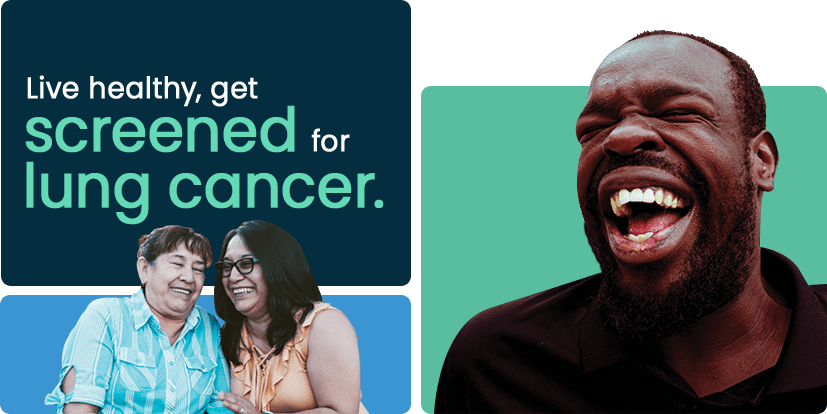
Lung cancer is the leading cause of cancer deaths in the United States. Finding it early through a screening increases your chance of living a longer, healthier life.
Lung Cancer - Are You at Risk?
Different cancers have different risk factors. Some risk factors, like smoking, can be changed. Others, like a person’s age or family history, air pollution, and previous radiation therapy to the lungs can’t be changed.
Top Five Risk Factors That You Can Change:
It's Never Too Late to Quit Smoking
Quitting at any age can lower your risk of lung cancer. Within one year of quitting, your risk begins to decrease. After 10 years, your risk is cut in half compared to someone who continues smoking.
And smoking can affect more than just your lungs. In fact, it can harm almost every part of your body.
Quitting smoking or using tobacco products, including e-cigarettes is hard. The good news is there is free help available right here in Connecticut:
Call CT Quitline 1-800-QUIT-NOW (1-800-784-8669) or visit www.CommitToQuitCT.com for more information.
Types of Lung Cancer
There are two main types of lung cancer. Each involves different treatment options. Your doctor will explore these options and advise on what's best for you.

Lung Cancer Screening
 The only recommended screening for lung cancer is low-dose computed tomography (also called a low-dose CT scan.) With this scan, an x-ray machine uses a low dose (amount) of radiation to make detailed images of your lungs. It takes just a few minutes and is not painful.
The only recommended screening for lung cancer is low-dose computed tomography (also called a low-dose CT scan.) With this scan, an x-ray machine uses a low dose (amount) of radiation to make detailed images of your lungs. It takes just a few minutes and is not painful.
Screening Saves Lives.
Only 16% of lung cancers are found at an early stage, often due to lack of early screening (only 6% of eligible people). This is unfortunate, given:
- Diagnosing early-stage lung cancer can drastically improve the survival rate of cancer patients.
- Research shows that over a 20-year period, those who were diagnosed early had an average survival rate of 80%.Symptoms occur mainly in late-stage lung cancer when the chance of survival is lower.
Get inspired by lung cancer survivors who were "Saved by the Scan" here.
Who is Eligible for Screening?
The U.S. Preventive Services Task Force (USPSTF) recommends annual lung cancer screening for people who:

Help with Screenings
Many health insurance plans cover preventive care like lung cancer screenings at low or no cost. If you do not have health insurance or have a high deductible health insurance plan, there may be community resources available to you.
To find out if you qualify for a free or low-cost screening, contact us: DPH-lungcancerscreening@ct.gov or call (860) 509-7804.
List of local screening programs and healthcare providers:
Lung Cancer Screening Test Sites
You've Been Diagnosed with Lung Cancer - Now What?
Once diagnosed, the next steps involve additional testing and consulting with a lung cancer specialist. Your healthcare team will work with you to develop a treatment plan based on the type and stage of your lung cancer. Your personal preferences and overall health will also be considered.
There are healthy habits that can help support your wellness during and after treatment, including:

Support Groups
- Online Community Support: The American Lung Association offers a free online support community for lung cancer survivors and their caregivers.
- Local Support Services: CancerCare in Connecticut provides support groups and counseling. They offer virtual appointments, too.
- Comprehensive Cancer Support: The American Cancer Society in Connecticut offers local fundraising events and cancer support programs, giving resources and support for lung cancer patients.
Financial Help
The Connecticut Cancer Foundation offers financial help to Connecticut lung cancer patients who are in active treatment. Help is based on financial need and availability of funds. There are other resources for those who need financial help. Some of these include:


